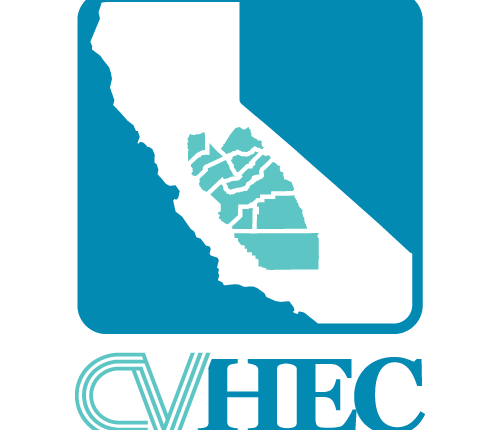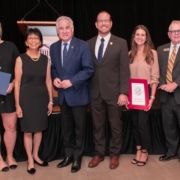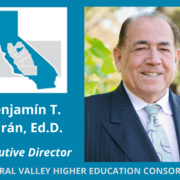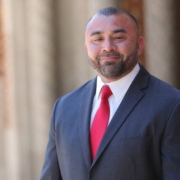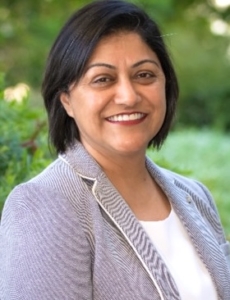SPOTLIGHT: CVHEC transitions – a new look
Central Valley Higher Education Consortium unveils new look
The Central Valley Higher Education Consortium (CVHEC) is rolling out a new look that includes new logos presented in this issue and a revamped website later this winter.
The 28-member strong consortium covers 10 counties in the Central Valley and the new primary logo — keeping to tradition while simultaneously modernizing — captures our region in the center of the state in a rounded square shape to help with placement in a variety of compositions.
The stylization of the “CV” and its notable visual distinction in the logo-mark represents the agricultural roots of the Central Valley and its importance as the region that CVHEC serves. As the primary logo, this mark will be the most commonly used for CVHEC branded touch-points. The two alternate Logos will also be used from time-to-time with internal, local, state and national partners.
“With the exciting addition of a new full-time staff member, an updated strategic plan and new initiatives launched this year, this is right time to refresh our look,” said Ángel Ramírez, CVHEC finance and operations manager.
MEMBER NEWS: CHSU celebrates accreditations
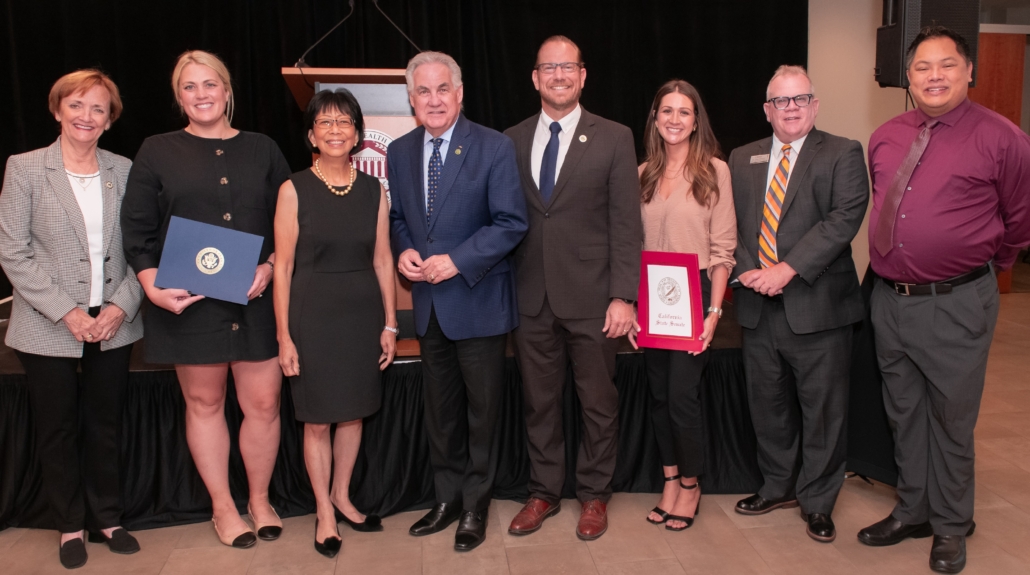
Celebrating the CSHU accreditation progress Aug. 10 (from left): Lynne Ashbeck, mayor of Clovis; Courtney Dunbar, district director for Congressman Vince Fong; Dr. Flo Dunn, founding president of CHSU; State Assemblyman Jim Patterson; Fresno County Supervisor Nathan Magsig; Jenna Welch, field representative for Senator Shannon Grove; Dr. John Graneto, founding dean of CHSU College of Osteopathic Medicine; Dr. Ronald Llenado, resident physician at UCSF Fresno Family Medicine Program and CHSU-COM Alum (2024).
Significant milestone: CHSU celebrates
full accreditation for all programs
(CLOVIS, Calif.)– The California Health Sciences University (CHSU), a member of the Central Valley Higher Education Consortium, held a celebration this week to commemorate achieving full accreditation for all its programs.
“Having our university accreditation recently reaffirmed, and our medical school, master’s program, and Simulation Center all achieving full accreditation is a significant milestone for our institution and a proud moment for all of us who are part of this vibrant community,” stated Dr. Florence Dunn, Founding President of CHSU, in her address at the event.
The Accreditation Celebration brought together over 300 people on the medical school campus in Clovis, including CHSU medical and pre-medical students, alumni, administration, faculty, staff, trustees, founders, elected officials, and community partners.
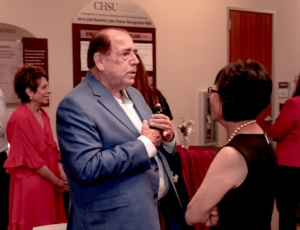
CVHEC Executive Director at the CHSU Accreditation Celebration with President Florence Dunn, a member of CVHEC Board.
Guests toured the Simulation Center for interactive experiences with high-fidelity manikins and augmented reality Holoanatomy demonstrations.
The founding dean of the CHSU College of Osteopathic Medicine, John Graneto, DO, stated, “In the past six months, we’ve had exciting news every month starting with our historic 100% residency match rate for our inaugural class of 2024 in March.”
Last April, full accreditation was granted for seven years to CHSU’s Doctor of Osteopathic Medicine program by the Commission on Osteopathic College Accreditation (COCA).
66 new physicians in the CHSU College of Osteopathic Medicine’s inaugural class of 2024 graduated at the Save Mart Center in May.
Ronald Llenado, DO, an alum from the CHSU College of Osteopathic Medicine’s inaugural class of 2024 is one of the 33% of his graduating class who matched for residency in the Central Valley. Dr. Llenado is now a first-year resident in the UCSF Fresno Family Medicine program.
“Matching at UCSF Fresno has been a dream come true. It allowed me to stay here in the Central Valley, where I’ve studied, built important relationships, and made a home. I’m also proud to say that CHSU graduates make up 25% of my intern class, further showing how CHSU is shaping the future of medicine right here in our community,” stated Ronald Llenado, DO, Resident Physician in the UCSF Fresno Family Medicine program and CHSU College of Osteopathic Medicine alum from the inaugural class of 2024.
He spoke at the Accreditation Celebration about his medical school experience at CHSU and connection to serving patients in the community through his clinical clerkships.
“The accreditation of CHSU is a landmark moment—not just for the school but for all of us who are part of its legacy. It’s a testament to the hard work, vision, and dedication that went into building a medical program that equips its students to serve our unique community and improve healthcare access for all,” remarked Dr. Ronald Llenado.
Other notable speakers at the celebration included long-time university supporters Assemblyman Jim Patterson, Fresno County Supervisor Nathan Magsig, and Clovis Mayor Lynne Ashbeck.
Mayor Lynne Ashbeck spoke about the CHSU medical school being transformational for this region.
“There is nothing more important that will define this region for the next 30 years than the health of our residents. If we can provide an environment where our families and kids can thrive, where our kids can actually see what it takes to become a doctor or other healthcare provider, and achieve those goals close to home and where we can all have access to those doctors to care for us then our region has a chance,” stated Lynne Ashbeck, Clovis Mayor.
Nathan Magsig, Fresno County Supervisor remarked, “There are going to be thousands of doctors that graduate from this facility and its going to change what the Central Valley gets to experience when it comes to care. I just want to say thank you to those individuals who were part of the vision to make this happen.”
Representatives from the offices of Congressman Vince Fong, Congressman Jim Costa, and Senator Shannon Grove also attended the event and presented CHSU with certificates of special recognition for achieving full accreditation for all its programs.
CHSU became accredited by the WASC Senior College and University Commission (WSCUC) in 2018. This summer, CHSU had its university accreditation reaffirmed by WSCUC.
When the fall semester began in July, the university received the news that all CHSU students are now eligible for Federal Financial aid to help them fund their medical school and master’s program education.
“These achievements are a shared victory with our entire community, and ultimately is for our students,” concluded Dr. Dunn.
Contact: Richele Kleiser, CHSU VP of Marketing and Communications at rkleiser@chsu.edu or 559 312 3892
See:
CHSU press release and photo gallery
About California Health Sciences University
California Health Sciences University (CHSU) is accredited by the WASC Senior College and University Commission (WSCUC). CHSU is the first university of its kind in the Central Valley and offers a local option for medical school and a master’s in biomedical sciences to help remedy the shortage of health care services offered in the Valley.
The CHSU College of Osteopathic Medicine (CHSU-COM) is accredited by the American Osteopathic Association’s Commission on Osteopathic College Accreditation (COCA). CHSU-COM now has about 600 medical students in attendance. The inaugural class of 2024 medical students graduated in May. The College matriculated its fifth cohort of over 150 students in July.
The university also offers a one-year Master of Science in Biomedical Sciences (MSBS) program at its College of Biosciences and Health Professions. The first cohort of MSBS students graduated in 2024, with over 60% of the graduates now attending the CHSU College of Osteopathic Medicine.
For more information about California Health Sciences University, visit chsu.edu or find them on Instagram, Facebook, and Linkedin.
###
MEMBER NEWS: Info sessions for North Valley Master’s Upskilling
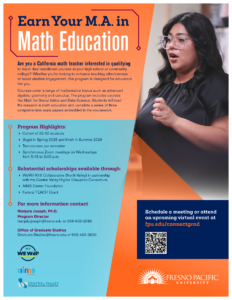
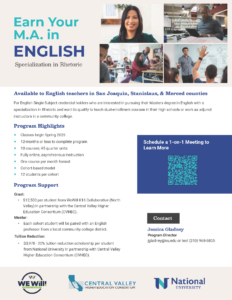 Recruitment of North Valley high school math and English teachers for dual enrollment qualification begins – info sessions set
Recruitment of North Valley high school math and English teachers for dual enrollment qualification begins – info sessions set
Applications are now available for 24 North Valley high school math and English teachers to enroll in the WE Will! K-16 Collaborative Master’s Upskilling Program sponsored by the Central Valley Higher Education Consortium and offered by National University and Fresno Pacific University.
The MA Upskilling Program qualifies them to teach dual enrollment courses. The cohorts will begin in spring 2025. Registration for online information sessions is now available. See WE Will! Grant story.
MEMBER NEWS: Consortium members earn Wall Street Journal rankings
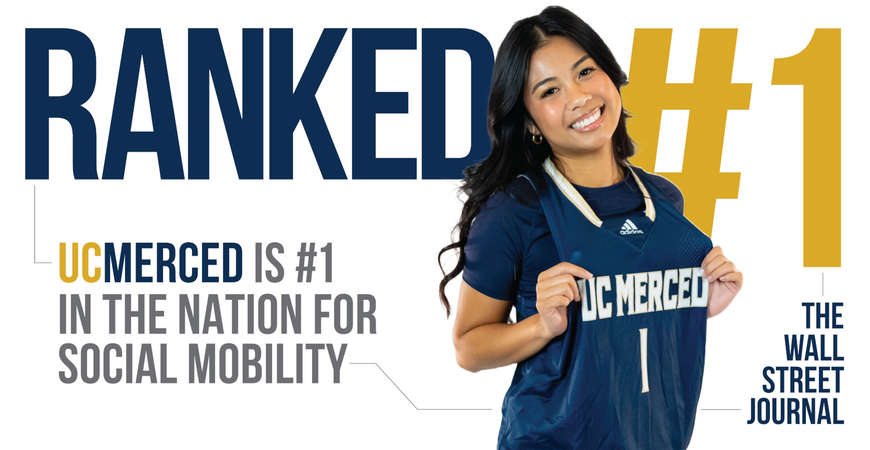
Several members of the CVHEC earned accolades in the WSJ rankings recently topped by UC Merced listed No. 1 for social mobility: California State University, Stanislaus came in second on the list of the top schools for social mobility; Fresno State was No. 4. and Fresno Pacific University was No. 14.
UC Merced is No. 1 university for social mobility in the US, new study says.
SEPTEMBER 09, 2024 3:19 PM
UC Merced is the No. 1 university in the nation for social mobility, according to new college rankings.
The Wall Street Journal recently teamed up with research partners College Pulse and Statista to rank the 2025 Best Colleges in the U.S., rating the top 500 universities in the United States.
In addition to awarding schools overall scores, the Wall Street Journal and College Pulse ranked universities based on best value, best salaries, student experience and social mobility.
“The WSJ/College Pulse Social Mobility ranking … rewards universities that take in the highest proportion of students coming from lower-income families,” the Wall Street Journal said, “while maintaining high graduation rates and having a positive impact on graduate salaries and minimizing the costs of attending the college.”
“At UC Merced, we routinely say that we don’t do what we do for rankings, but when you excel others will always take notice,” university Chancellor Juan Sánchez Muñoz said in a Sept. 4 news release. “We hope this recent acknowledgment will be yet another opportunity for people to learn about the exceptional culture of student success that has taken root at UC Merced.”
WHY IS UC MERCED NO. 1 FOR SOCIAL MOBILITY?
UC Merced landed at top of the WSJ/College Pulse Social Mobility ranking with a score of 86.8 out of 100
The university was No. 18 on the overall list of Best Colleges in the U.S. with a score of 84 out of 100, up from No. 59 in 2023.
According to the Wall Street Journal, it costs $13,450 per year on average to attend UC Merced, including tuition, fees, room and board and books and supplies.
However, the value added to graduates’ median salary attributable to them attending UC Merced is $33,874, the Journal found.
UC Merced has a variety of programs that have helped students excel academically, including the Center for Educational Partnerships and the Fiat Lux Scholars program.
The Center for Educational Partnerships works with Central Valley schools serving students in kindergarten through 12th grade help kids become “college and career ready,” UC Merced said on its website, while the Fiat Lux scholars program focuses on providing first-generation college students with academic success and housing options.
The university also partners with College Track, an organization that helps students from low-income community get their bachelor degrees.
About 60% of the student body of UC Merced is comprised of Pell grant-eligible students who have exceptional financial needs, and 65% are first-generation college students according to the news release on Sept 4.
HOW DID OTHER CALIFORNIA UNIVERSITIES RANK?
California State University, Stanislaus, in Turlock came in second on the list of the top schools for social mobility.
California State University, San Bernardino, took third place, while Fresno State was No. 4. California State University, Los Angeles, rounded out the top five.
Elsewhere in the Central Valley, California State University, Sacramento, landed at No. 13, while Fresno Pacific University was No. 14 and UC Davis was No. 32.
WHAT ARE THE TOP 10 UNIVERSITIES FOR SOCIAL MOBILITY?
These are the top 10 universities in the nation in terms of enhancing students’ social mobility, according to Wall Street Journal and College Pulse:
- UC Merced
- California State University, Stanislaus
- California State University, San Bernardino
- Fresno State
- California State University, Los Angeles
- Florida International University in Miami
- California State University, Long Beach
- Baruch College in New York
- California State University, Northridge
- California Polytechnic State University, Pomona
HOW DID WALL STREET JOURNAL COME UP WITH ITS RANKINGS?
The Wall Street Journal partnered up with College Pulse and Statista to rank schools using “the latest data available for analysis, it said.
In the social mobility category, schools were scored based on the following components:
Social mobility salary impact
Social mobility graduation rate impact
See:
UC Merced press release: UC Merced Ranked No. 1 in the Nation for Social Mobility, No. 18 Overall
Fresno State News press release: Wall Street Journal ranks Fresno State in top five nationally for social mobility
Stanislaus State press release: Stanislaus State Ranks No. 24 in the Nation on Wall Street Journal’s 2025 Best Colleges
CVHEC DIRECTOR’S MESSAGE (Summer 2024): A break for reflection
Summer break provides pause for reflection
Greetings CVHEC friends and colleagues!
I welcome you to the mid-summer edition of our CVHEC newsletter. We hope you are having a restful and enjoyable summer and taking time to recharge and prepare for the upcoming fall semester.
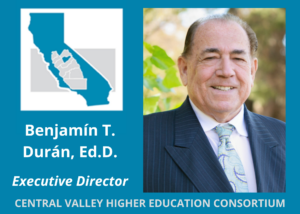 This time of the year we try to step back, take a breath and highlight the great work that has been taking place on our member campuses by the dedicated faculty and staff.
This time of the year we try to step back, take a breath and highlight the great work that has been taking place on our member campuses by the dedicated faculty and staff.
As you visit the entries, you will get a sense of the efforts across the Central Valley in the last six months to improve access, retention and completion of students at our CVHEC member institutions in the region.
We also acknowledge ongoing transition in the region’s higher education scene with CEO changes at WHCCD, Porterville College, Fresno City College and Clovis Community College. One of those changes is the departure of Dr. Claudia Habib who left her Porterville presidency this month for the Ventura College presidency. We thank President Habib for her service to her students and to the CVHEC board.
All the best Claudia …as well as to Dr. Kristin Clark whose retirement as chancellor of WHCCD takes effect Aug. 8. We are especially appreciative of her service as the chair of the CVHEC board the past few years. We said our goodbyes to Kristin at our recent board executive committee meeting and also at a farewell reception for her July 26 at Lemoore College.
Speaking of the board, members should have received detailed info about our upcoming quarterly meeting in early September. If you have not received anything, please do contact Angel Ramirez at centralvalleyhec@gmail.com ASAP.
Finally, please allow me to close this summer message with a Happy Birthday greeting to … US! It was on Aug. 5, 2002 that CVHEC became formally incorporated under the leadership of then Fresno State President John D. Welty. Watch for more about our history in the near future.
We hope you enjoy our newsletter and continue enjoying your summer.
MEMBER NEWS: CSU PK-3 Early Childhood Credential Programs – Fresno State one of first approved
Fresno State’s program to help meet unprecedented need for
new teachers in California planned for Summer 2025 launch
Two California State University (CSU) campuses are the first universities in California to receive approval to start offering teacher preparation programs for the new PK-3 Early Childhood Education Specialist Instruction Credential: San José State and Fresno State, a member of the Central Valley Higher Education Consortium.
To date, the San Diego County Office of Education and Riverside County Office of Education are the only other institutions that have received approval by the California Commission on Teacher Credentialing (CTC).
“As home to the largest teacher preparation program in California and among the largest in the nation, the CSU is proud to once again lead the way in producing teachers that will change the trajectory of our children’s lives and elevate the early childhood education workforce,” says Shireen Pavri, Ph.D., assistant vice chancellor of Educator & Leadership Programs at the CSU Chancellor’s Office. “We are thrilled about the potential of this new PK-3 early childhood education credential to provide a strong and equitable early learning foundation for our youngest and most diverse learners in the state.”
California’s phase-in of universal transitional kindergarten has triggered the unprecedented need to expand the early teaching-learning workforce in the state. Answering California’s call for 12,000 to 15,000 new teachers by 2025-26, the CSU and its campuses have fast-tracked the development of PK-3 Credential programs. The PK-3 Credential, which authorizes graduates to teach children in pre-kindergarten (PK) through 3rd grade, aims to produce qualified teachers who have the necessary skills to provide age-appropriate and culturally responsive instruction. Different from a Multiple Subject Teaching Credential, the PK-3 Credential requires child development/early childhood education coursework that is specific to the development of a young child and how they learn.
San José State will offer its PK-3 Credential programs beginning this fall, while Fresno State is slated for a Summer 2025 start. Seventeen additional CSU campuses, as well as CalStateTEACH—the CSU’s fully online program—are in various stages of developing their PK-3 Credential programs for approval by the Commission on Teaching Credentialing. Each program is being expertly designed by faculty across several disciplines to produce educators who are specialized in using developmentally appropriate practices to teach young multilingual and multicultural children in inclusive settings.
The CSU prepares 48.9% of the state’s teachers and awards approximately 5,200 California teaching credentials annually. To learn more about the CSU’s efforts in preparing California’s future educators, visit the Educator and Leadership Programs website.
SEE: CSU press release
INFO: Strategic Communications and Public Affairs (562) 951-4800
About the California State University
The California State University is the nation’s largest four-year public university system, providing transformational opportunities for upward mobility to more than 450,000 students from all socioeconomic backgrounds. More than half of CSU students are from traditionally underrepresented backgrounds, and more than one-quarter of undergraduates are first-generation college students. Because the CSU’s 23 universities provide a high-quality education at an incredible value, they are rated among the best in the nation for promoting social mobility in national college rankings from U.S. News & World Report, the Wall Street Journal and Washington Monthly. The CSU powers California and the nation, sending nearly 127,000 career-ready graduates into the workforce each year. In fact, one in every 20 Americans holding a college degree earned it at the CSU. Connect with and learn more about the CSU in the CSU newsroom.
BOARD NEWS: SCCCD announces interim presidents at Fresno City and Clovis Community Colleges
Armstrong to serve as FCC interim,
Chahal is Clovis interim
The State Center Community College District announced two interim presidential selections in the wake of Fresno City College President Robert Pimentel’s appointment as West Hills Community College District chancellor in June:
• Dr. Kim Armstrong will serve as the acting president of Fresno City College. Dr. Armstrong, currently serving as the president of Clovis Community College, will bring her wealth of experience and her extensive leadership qualities to continue the excellent work at Fresno City College.
• Dr. Monica Chahal, vice president of Instruction at Clovis Community College, will step into role of Interim College President with Dr. Armstrong’s transition to Fresno City College. Dr. Chahal’s dedication to educational excellence and student success makes her well-equipped for this interim leadership position.
Also, the Fresno City College Vice President of Administrative Services, Dr. Omar Gutierrez, has been appointed as the Chief Business Officer at Southwestern College in Chula Vista. Ms. Glynna Billings will assume the role of Interim (Provisional) Vice President of Administrative Services at Fresno City College until the position is advertised and filled. Ms. Billings currently serves as District Accounting Manager, where she supervises State Center’s accounts payable, payroll, and other vital financial operations.
The District will open the position of Interim Vice President of Instruction at Clovis Community College for which internal candidates across the District may apply.
State Center Chancellor Dr. Carole Goldsmith said, “I have full confidence in our leadership team and the entire District as we navigate these transitions and continue our mission of providing quality education and support to our students. These strategic appointments reflect the District’s deep commitment to maintaining positive momentum and our focus on advancing equitable student access and achievement across the district. We are fortunate to have such talented and versatile individuals in our District.”
WHAT THE CV-HEC IS HAPPENING BLOG (Summer 2024): Why some colleges are worth it
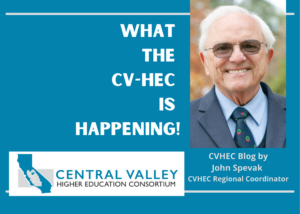 In the “What the CV-HEC is Happening” Blog for our summer 2024 special edition, Dr. John Spevak presents an observation about the value of a higher education. Dr. Spevak, who is a vice president-emeritus of Merced College and currently a regional coordinator for CVHEC, coordinates the English and Math Task Forces for the consortium — all champions for student support through such measures as dual enrollment. Through the consortium task forces, the former English teacher and college administrator continues to work closely with educators in the field for the educational advancement of students.
In the “What the CV-HEC is Happening” Blog for our summer 2024 special edition, Dr. John Spevak presents an observation about the value of a higher education. Dr. Spevak, who is a vice president-emeritus of Merced College and currently a regional coordinator for CVHEC, coordinates the English and Math Task Forces for the consortium — all champions for student support through such measures as dual enrollment. Through the consortium task forces, the former English teacher and college administrator continues to work closely with educators in the field for the educational advancement of students.
Higher ed is still a good
investment … and attainable
BY DR. JOHN SPEVAK
CVHEC Regional Coordinator
Vice President-Emeritus – Merced College
According to the results of a recent poll by Gallup and the Lumina Foundation, Americans are losing faith in the value of a college education.
Overall, according to that poll as reported by the Associated Press, only 36 percent of adults say they have a “great deal” or “quite a lot” of confidence in higher education. What’s worse, the poll shows that 32 percent of Americans have little or no confidence in a college education.
That’s both misleading and misguided.
For one thing “college” can mean different things to different people. For another, having a degree from the right college can make a big difference in a person’s opportunity and income.
By “right college,” I don’t mean a prestigious private college. A right college often means, especially in California, a two-year community college, a state university, or a small private college which provides significant financial aid.
A two-year community college degree or a certificate of completion is indeed “college.” That degree or certificate can be very valuable, especially if it’s a career-technical program that’s in demand and pays well, like nursing or welding.
A four-year degree can be even more valuable, especially in fields like communications, business, health, information technology and engineering– to name a few. Their lifetime earnings are significantly higher than those with a degree.
As the Associated Press article pointed out, “For those who forgo college, it often means lower lifetime earnings, 75 percent less compared with those who get bachelor’s degrees, according to Georgetown University’s Center on Education and the Workforce. And during an economic downturn, those without degrees are more likely to lose jobs.”
One of the reasons many Americans are doubting the worth of a college education is the debt often incurred in getting one. As one person interviewed in the AP article put it, “You graduate out of college, you’re up to eyeballs in debt, you can’t get a job, then you can’t pay it off.
What’s the point?”
It’s true that many people over the past decades have incurred a significant debt from student loans, which is exacerbated by the exorbitant interest charged for these loans. I know several people who have long ago paid off the principal of their student loans but are still paying and paying the interest.
However — and this had to be noted, known and understood — a person today can get a college degree without going into significant debt. The cost, for example, of attending a California community college these days in terms of tuition (also known as enrollment fees) is often zero.
Many California community colleges are also working at reducing the cost of books by providing what’s called “open educational resources,” essentially free online textbooks, often created by the college’s faculty members.
Attending a California public university or small private college can also be financially available to most Californians, especially if they begin with a two-year associates transfer degree and then follow a plan of courses that get them to the bachelor’s degree in no more than two additional years.
I’m tired of so many Americans of all backgrounds thinking of “college” as only prestigious private institutions that charge $150,000 or much more for a four-year tuition. Those universities often have value for those who can afford it or who receive full scholarships. But the vast majority of people can’t afford that amount and can’t afford to take out loans to pay for it.
“College” for most people should not be an expensive private institution. If it were, I would also wonder if a college education was worth it. However, “college,” in California and especially in the Central Valley, is accessible, affordable and worth it.
Instead of young people (and their parents) asking, “Can I afford college,” I wish they would ask, “What are my college options? What are the real costs, not just according to pundits on TV or social media, but according to the colleges themselves.”
College personnel, more than ever, are ready and willing to talk with prospective students of all ages and the parents of younger students about the real cost of a college education. And they are also ready and willing to show prospective students the extensive personal help they will receive to succeed in courses and earn their degree.
Often television and social media pundits who say college is not worth it are people who themselves have benefited from a college education. There’s some hypocrisy in that.
It’s true that there are many hard-working Americans without a college degree who can support themselves and their families, but the odds of most people doing this are long.
In California’s Central Valley, where the median family income is below the national average, it’s especially important to dispel the myth that college is not worth it. A two-year or four-year college degree is one of the best ways to achieve an income that will sustain families — enable them to pay rent or a mortgage, purchase a reliable car, buy clothes and put food on the table.
Central Valley colleges from Stockton to Bakersfield are working harder than ever to show students the value of a college education and to streamline the paths to a degree.
Community colleges in the valley, for example, are offering more dual enrollment courses than ever where students can earn college credits in high school, which reduces their time to a college degree.
These dual enrollment courses can be taken by most high school students, not just those students who in the past were steered into advanced placement (AP) courses. Community colleges are also working harder than ever, in collaboration with their high school partners, to provide the academic support needed to successfully complete dual enrollment courses.
In addition, many Central Valley community colleges, including Merced College, are partnering with the University of California Merced and local California State University campuses to provide user-friendly guides or “maps” to students and their parents. “Pathways Program Mapper” is a tool these colleges have developed that is available to anyone with a cell phone (no login or password required).
PPM will show a student what degree is needed to enter a particular career (for example, biology, business, engineering, etc.), what range of salaries people in those careers earn and then provide a map of courses from the first semester at a community college to the last semester at a university to attain that degree in the shortest possible time.
So, please, pundits, stop telling people that a college education isn’t worth it. Moreover, I hope readers of this column spread the word that here in the Central Valley a college education is not only worth it, but it’s attainable for anyone willing to pursue it.
John Spevak’s email is john.spevak@gmail.com.




